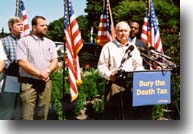| ||
|
|
|
|
|
House fails to override death tax veto |
|
| ||||||||||
|
governmental relations. "Two years ago, not many Democrats would have touched this issue. This year, 65 Democratic representatives voted to end death taxes." Legislation ending the death tax passed the House, June 9, by a vote of 279-136. The Sept. 7 override vote was 274-157 in favor, 14 votes short of the two-thirds majority required. "Two-thirds of the House did vote to end death taxes, just not on the same day," Wolff said. House Majority Leader Dick Armey (R-Texas), Reps. J.C. Watts (R-Okla.), Jennifer Dunn (R-Wash.), John Tanner (D-Tenn.) and Neil Abercrombie (D-Hawaii) held a bipartisan press conference before the override vote. Illinois Farm Bureau member Lee Eichhorst also participated and explained why death taxes must die. "After a lifetime of high input costs and weak commodity prices, these death tax costs are literally the final straw," said Eichhorst. With a House override, estate taxes would have been reduced by about 15 percent over 10 years, until the tax was completely eliminated in 2010. Explaining why death taxes hit farmers so hard, AFBF President Bob Stallman urged the House to maintain the work they had done to help ensure farmers will have a legacy to pass on to their children. "Over 90 percent of U.S. farms are owned by individuals, family partnerships or family corporations who continually improve their land and buildings with hopes of transferring a successful operation to their sons and daughters," Stallman said. "But when the government comes calling for the cold cash to pay off death taxes, family members are frequently forced to sell the farm, piece by piece." Armey said before the vote that if representatives failed to override Clinton's veto, Republicans would not be willing to negotiate a scaled-back version. "We've
carried it as far as we can this year," Armey said. "We expect to be
back next year. We expect to pass it." |
|
FRONT PAGE PAST ISSUES MEMBERSHIP UPDATE CONTACT US [News] [Views] [Issues] [Today's Ag] [Ag Connect] [About FB] [Contact Us] [Site Map] [Home Page] © 1996-2000 - American Farm Bureau Federation. Legal
Notice |
